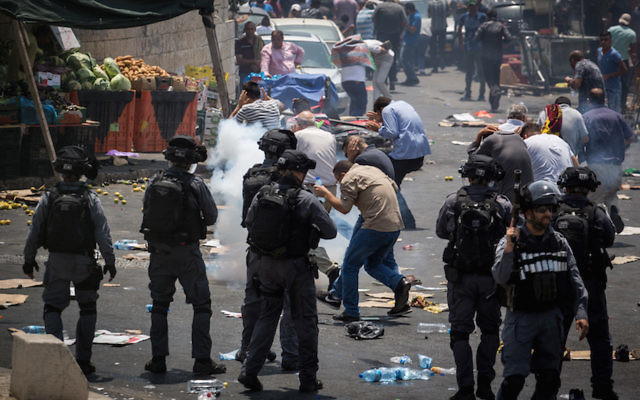Israel removes Al-Aqsa metal detectors
IN what looked like a desperate attempt to stop tensions spiralling out of control, the Israeli government has dismantled the metal detectors at entrances to the Al-Aqsa Mosque and Temple Mount compound.
The decision came on the heels of a surprise development in the region on Sunday, which suddenly put a major diplomatic clash between Israel and Jordan on the horizon if Jerusalem didn’t agree to back down on the controversial metal detectors.
The battle against the metal detectors, installed by Israel after two of its police officers were fatally shot on the Temple Mount a fortnight ago, had become the rallying cry of Palestinian radicals. Many Palestinians are citing the detectors as a factor that fuelled last Friday’s Halamish attack.
Radicals were raging against the metal detectors as part of a long-running campaign claiming that Israel is trying to marginalise them at Al-Aqsa. They used the metal detector issue to galvanise mass riots in Jerusalem and the West Bank last Friday, which saw attacks on Israeli security forces and the death of three Palestinians. Some 27 Palestinians were arrested.
Meanwhile, more moderate players in the region, including the Palestinian Authority and the Jordanian trust that governs the day-to-day running of the mosque, were also engaged in a bitter campaign against the metal detectors.
The PA and the mosque’s trust, known as the Waqf, even orchestrated a boycott of Al-Aqsa, urging Arabs to refuse to pass the metal detectors and pray nearby instead. PA President Mahmoud Abbas also said that he is suspending security coordination with Israel, under which the PA helps Israel to catch terrorists. Abbas explained the decision saying that Israel “does not have the right to install these metal detectors, because having sovereignty over al-Aqsa Mosque is our right.”
Until Sunday night, an Israeli-Palestinian escalation looked likely. Palestinian leaders were ramping up tensions citing the metal detectors, and Prime Minister Benjamin Netanyahu of Israel was refusing to remove the detectors, despite assessments by some senior Israeli security figures that they were unnecessary.
The development that seems to have changed the course of things took everyone by surprise. Folowing attacks on synagogues in Turkey, sparked bt the metal detector controversy, and an online call from ISIS for Jewish institutions to be targeted, late on Sunday at Israel’s embassy compound in Amman, Jordan, a local man attacked an Israeli guard called Ziv with a screwdriver. The guard responded by shooting and killing him, and a Jordanian bystander was also shot dead. It is unclear whether the attacker acted out of radicalism or other motives.
Suddenly, Israel was facing a potential crisis with Jordan, the custodian of Al-Aqsa and one of its most peaceful neighbours. Leading figures in Jordan wanted the Israeli guard put on trial and the family of the man he shot was calling for the death penalty. Israel said that the guard enjoyed diplomatic immunity and planned to evacuate its whole diplomatic mission, but Amman was refusing to let the guard leave.
The American administration got involved to try to calm tensions, and within hours the entire Israeli diplomatic mission – including the guard – was on the way back to Jerusalem. The relief was evident when the guard Ziv met Netanyahu shortly after his return on Monday. “A weight has been lifted from my heart,” the guard told Netanyahu.
A few hours later Israel’s Security Cabinet met to approve a decision to dismantle the metal detectors – and by Tuesday afternoon they were gone. The Security Cabinet said that it “accepted the recommendation of all of the security bodies to incorporate security measures based on advanced technologies – ‘smart checks’ – and other measures instead of metal detectors in order to ensure the security of visitors and worshippers in the Old City and on the Temple Mount”.
Some Palestinian leaders were delighted by Israel’s u-turn, as were several Israeli Arab leaders. The Arab Knesset member Jamal Zahalka told Palestinian media: “The removal of the metal detectors is a victory for the young people of Jerusalem and for the religious leadership. We proved that we could get it done.”
However, it’s unclear how far Israel’s move will go to calming tensions. Some Palestinians feel the political momentum they gathered from the metal detector issue is an opportunity too good to miss, and want to move the goalposts and maintain the Al-Aqsa boycott citing other grievances against Israel.
Even after the metal detectors were removed Palestinians were still in protest mode and still refusing to enter Al-Aqsa, as Waqf chairman Sheikh Abd al-Athim Salhab said that he was still deciding whether to accept the outcome of the dispute.
Abbas said that he will “study” the latest development but stressed that for the moment, security coordination with Israel remains frozen.
NATHAN JEFFAY


comments